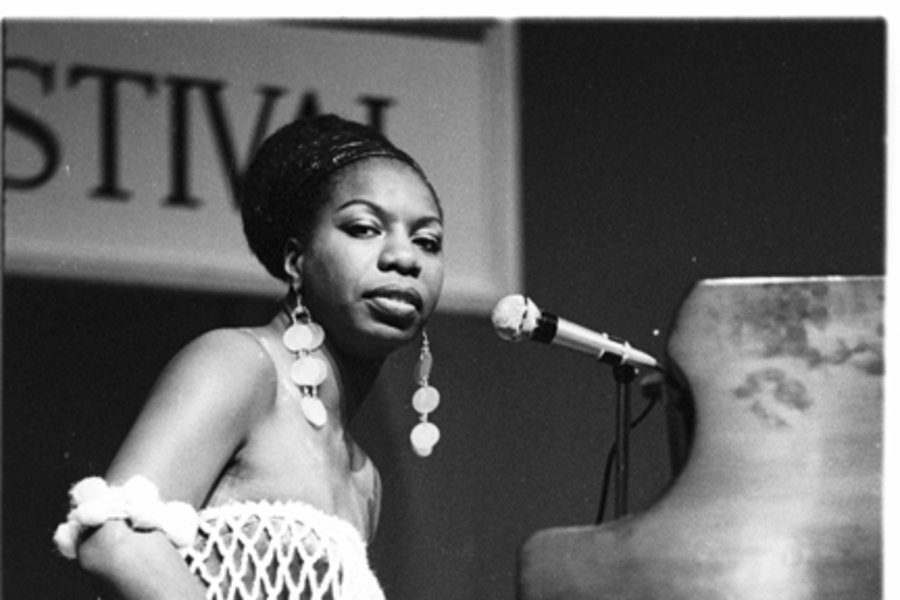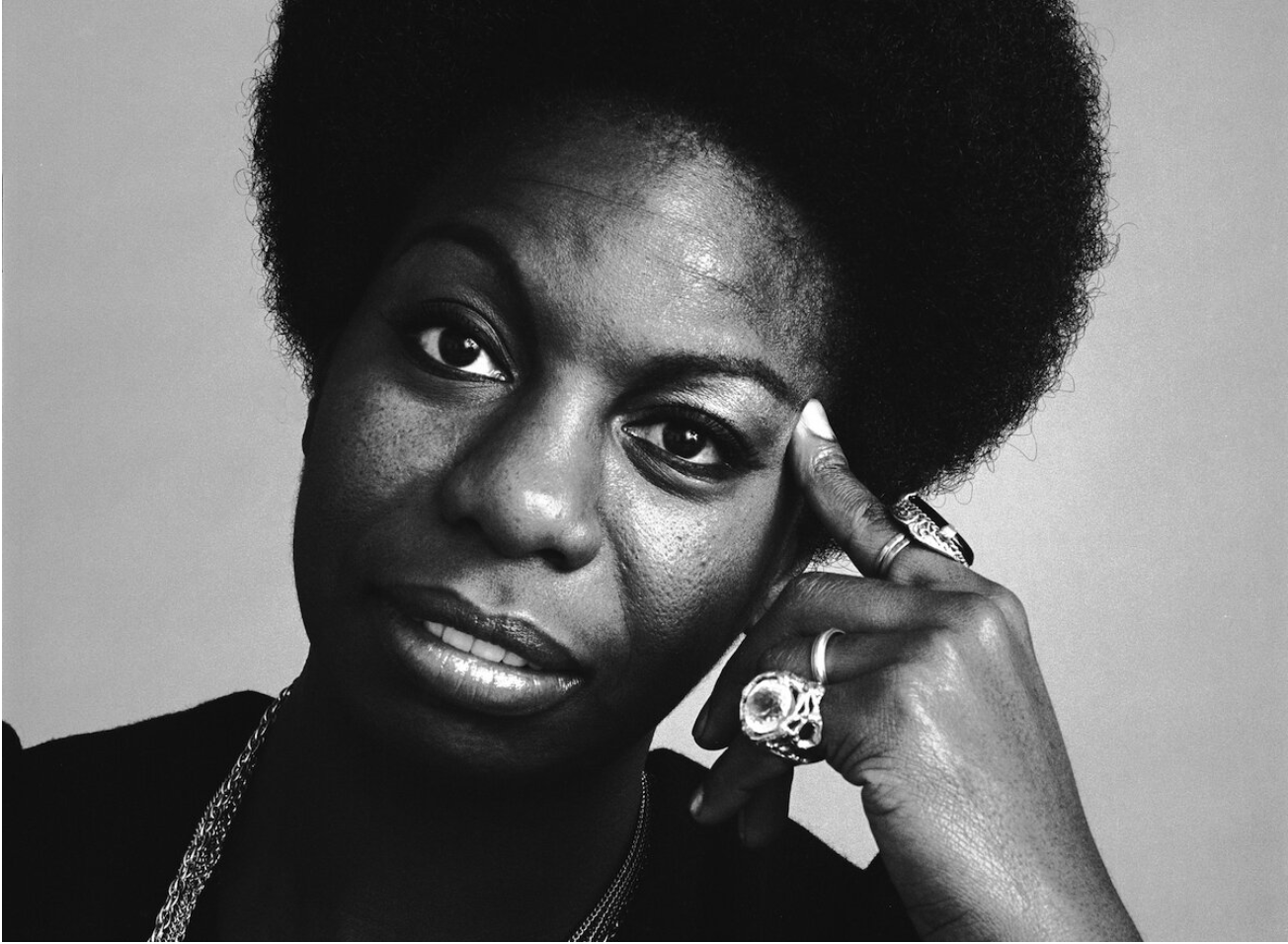This year’s Black History Month focuses on the theme ‘Celebrating our Sisters, Saluting our Sisters, and Honouring Matriarchs of Movements’, highlighting the role Black Women have played in shaping history and celebrating their contributions to the world as we know it – from music and literature, to politics and academia, social and healthcare, and hard won civil rights across the world.
To mark this occasion, we invited Yewande Adeniran to write a series of ‘Black Women in Jazz’ profiles, as a way of joining the chorus of voices honouring the too often unsung Black female artists who have helped define the genre we love.
The first of these profiles is of none other than Nina Simone. It comes just a few days after we had the pleasure of joining her daughter Lisa on stage at Cadogan Hall, for the London leg of her tour Keeper of the Flame: A Daughter’s Tribute to Dr Nina Simone.

Nina Simone
Much can be said about Nina Simone, one of the great jazz artists of the 20th century. Born in Tryon, North Carolina in 1933, Nina Simone neé Eunice Waymon was more than a legendary singer. She was a powerhouse of good. A key Civil Rights activist, the “High Priestess of Soul”’s legacy influenced all our favourite artists from Lauryn Hill, Usher, Erykah Badu, Nick Cave, Christina Aguilera and of course Aretha Franklin.
Her foray into challenging anti-Blackness whilst simultaneously championing Black empowerment, is a core element of her music. Starting this journey at the age of 12 when she gave a piano recital and due to the Jim Crow laws at the time, her parents were forced to stand at the back. This moment radicalised her, sedimenting her commitment to the Civil Rights Movement. She befriended Martin Luther King and Malcolm X, two figures with differing approaches to Black Liberation who between them galvanised the various Black communities under one cause with her 1964 song “Mississippi Goddam” as the soundtrack. With her musical talents expanding far beyond jazz and cabaret to soul and blues to folk and gospel covers of Bob Dylan, Bee Gees and her forever iconic inimitable Screamin’ Jay Hawkins, “I Put a Spell on You” garnering her widespread acclaim and a new fan base.
Before this, despite the barriers and the overt racism at every turn, she pursued her dream of studying classical music at Julliard School of Music in New York. At this point she began performing as a pianist and it wasn’t long before her vocal career began in nearby Atlantic City, New Jersey, when the nightclub owner threatened to fire her unless she sang too. Her raspy, emotionally intense and urgent style of singing gripped audiences and 5 years later in 1959, her first album “Little Girl Blue: Jazz as Played in an Exclusive Side Street Club” on Bethlehem Records was released. It featured her first chart topping single “I Loves You, Porgy” which peaked at number 18 in the pop charts and number 2 in the R&B charts. Overnight, Nina Simone became a sensation.
Despite this continuous success, her life was far from easy. She left the United States in 1973 and lived in Barbados, Liberia and France amongst other places, due to the horrifc levels of racism. Known for her turbulent personal life and rightly unashamed onstage behavior, her defiance to do the expected is what sealed her status as a trailblazer. In 1966, the song “Four Woman” written about a quartet of African-American women – a prostitute, an activist, an interracial woman and a daughter on enslaved people – was banned in Philadelphia and other cities. Expressed with gut wrenching honesty, she never stopped her unfiltered analysis of everyday life and as time went on, ill health, she embodied every facet of the human condition.
Although Nina Simone has since passed from breast cancer, her legacy can still be felt in every corner of the music industry. In 2015, the documentary “What Happened, Miss Simone?”, directed by Liz Garbus was an intimate portrayal. And even nominated for an Oscar and those of us chronically online will remember both Beyoncé and Lana Del Rey praising the film and of course the following and slightly controversial film “Nina” starring Zoe Saldana. Rare archive footage, interviews, never-before-heard recordings, heartfelt anecdotes centred the biopic. Whilst we remember and memorialise the great late Nina Simone, we must not sanitise her past, as despite her reverence, did not receive her due flowers while she was alive. But now, we can do so and keep her fighting spirit alive with us everyday.
About Yewande Adeniran
Yewande Adeniran, also known under the artist name Ifeoluwa, is known for heading up INTERVENTION, the DJ, production & lighting workshop that travels the UK offering a welcoming space for women and all marginalised people to come together and celebrate all things dance. They’re a multi-disciplinary artist with exhibitions in Sheffield, London and Bristol. As an academic, they’ve given lectures and talks on “The Black Avant Garde” and “Temporal Dichotomies & Speculative Mythologies” and at Berlin’s music and discourse festival CTM. You can find Yewande’s writing at outlets like VICE, The Wire, Mixmag, Resident Advisor, and gal-dem magazine.
